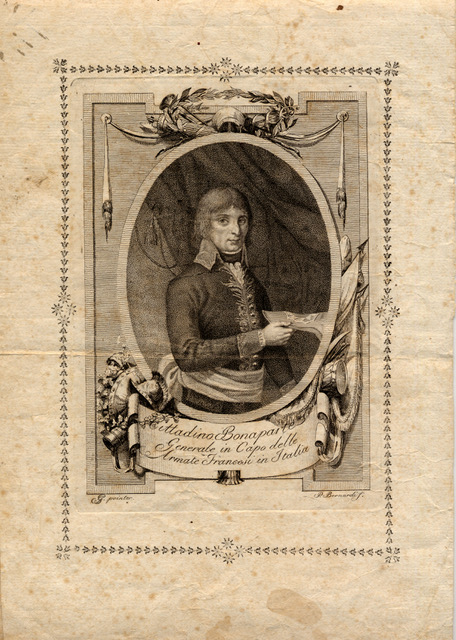2021 Année Napoléon > Comitato di Bologna dell’Istituto di Storia del Risorgimento

The Institute for the History of the Risorgimento in Bologna is organising a series of online meetings and talks in Italian in 2021 on the occasion of the bicentenary of Napoleon’s death.
For more information, please contact Elena Musiani, PhD Università degli Studi di Bologna, Alma Mater Studiorum.
This information was updated on 21 April 2021.
Talks > “è arrivato Napoleone allo sparo dell’artiglieria ed al suono delle campane della città ». Napoleone, l’Italia, Bologna (“Napoleon has arrived with the firing of the artillery and the ringing of the city bells”. Napoleon, Italy, Bologna”)
March – June 2021
This series of talks aims to show the influence of the French presence in Bologna during the Napoleonic era.
After a brief stay in the city as a general in the Italian army in 1796, Napoleon entered Bologna in 1805 through the San Felice gate as Emperor and King of Italy, welcomed, as the city authorities reported, by the ringing of bells before receiving the homage by the citizens.
A festive moment that opened a period of profound transformation of the city, not only in terms of its urban planning but also in terms of its scientific and cultural reputation. It was then that the Certosa cemetery was founded on the model put forward by Chaptal, and the French authorities set about restoring the Bolognese educational system to its “ancient splendour”. Bologna then benefited from the modernising impetus given to Italy by Napoleon, an impetus that brought about profound changes in the political framework as well as in science and the arts.
The events of the Committee set up to celebrate the bicentenary of the Emperor’s death will address the various aspects of these “French years” in the field of history, art and music.
It will take place under the direction of the Comitato di Bologna dell’Istituto di Storia del Risorgimento, the Museo Civico del Risorgimento in Bologna and with the collaboration of the music and dance association “8centoAps”.
The programme has obtained the patronage of the Institute for the Study of the History of the Italian Risorgimento and has been included in the programme of the Italian National Committee for the Napoleonic Bicentenary.
Programme of talks
Wednesday 24 March: Angelo Varni: Introduzione
Wednesday 31 March: Jadranka Bentini: “Ritratto e storia, specchi del potere”
Wednesday 7 April: Maria Chiara Mazzi: “Napoleone e la musica: dalla musica a Napoleone”
Wednesday 21 April: Jadranka Bentini: “Le déracinement e l’idea del Louvre”
Wednesday 5 May: Mirtide Gavelli, Roberto Martorelli, Elena Musiani, 8cento Aps: “L’eredità di Napoleone a Bologna”
Wednesday 12 May: Lilla Crisafulli: “Dall’illusione alla disillusione: il Napoleone di Lord Byron”
Wednesdayì 19 May: Carmine Pinto: “Dalle guerre napoleoniche alla fine dello spazio borbonico (1806-1823)”
Wednesday 26 May: Maria Chiara Mazzi: “Napoleone e la musica: da Napoleone alla musica”
Tuesday 8 June: Alberto Preti: “Battere il nemico con le gambe dell’Armée: Napoleone e la manovra di Ulm”
Wednesday 16 June: Nicoletta Marini d’Armenia, “Guerre napoleoniche e luoghi della memoria in Europa”.
► ► These Napoleonic talks are being recorded and made available in a playlist on the Committee’s YouTube page.
Full programme (in Italian)

GENERAL Information
List of partners of “2021 Année Napoléon”.
Follow the special Instagram account for “2021 Année Napoléon” events.
Follow the Fondation Napoléon’s Facebook page in English.
Follow the Fondation Napoléon on Twitter.
Consult the page of the partner publishers and their published or republished works
on the occasion of the bicentenary of Napoleon’s death.
Subscribe to our free weekly newsletter (French or English).
PrEsentation OF THE Comitato di Bologna dell’Istituto di Storia del Risorgimento
Le Comité de Bologne de l’Institut d’Histoire du Risorgimento italien s’est donné pour tâche depuis l’avènement de la République italienne de promouvoir et valoriser les recherches sur l’histoire du processus d’unification nationale en « longue durée » depuis les « années françaises » jusqu’à la Première guerre mondiale avec un regard comparatif et transnational.
Le Comité collabore étroitement avec l’Institut d’histoire du Risorgimento national établi à Rome et avec le Musée civique du Risorgimento de Bologne. Ce dernier inauguré le 12 juin 1893 se trouve désormais sur le terrain de la Casa Carducci, dernière demeure du poète, située au 5 de la Piazza Carducci. Le parcours historique présenté par le musée va de la Révolution à la Grande Guerre et privilégie une approche locale des évènements.
Since the advent of the Italian Republic, the Comitato di Bologna dell’Istituto di Storia del Risorgimento Bologna (Committee of the Institute for the History of the Italian Risorgimento) has taken on the task of promoting and enhancing research on the history of the process of national unification over the large period, namely, from the “French years” to the First World War, with a comparative and transnational perspective.
The Committee collaborates closely with the Istituto di Storia del Risorgimento (Institute for the History of the National Risorgimento) in Rome and with the Museo Civico del Risorgimento in Bologna. The latter, inaugurated on 12 June 1893, is now located on the grounds of the Casa Carducci, the poet Carducci’s last home, in Piazza Carducci 5. The historical tour presented by the museum goes from the Revolution to the Great War and favours a local approach of the events.
→ Follow the Facebook page of the Museo Civico del Risorgimento
